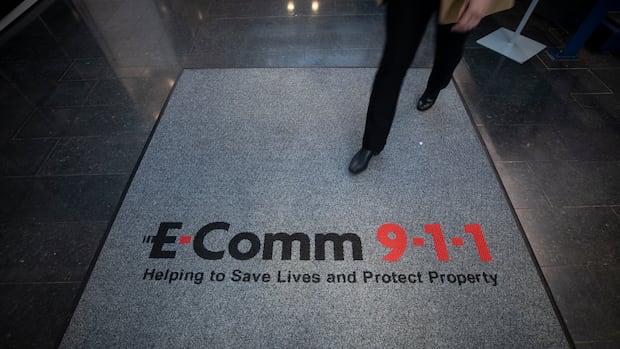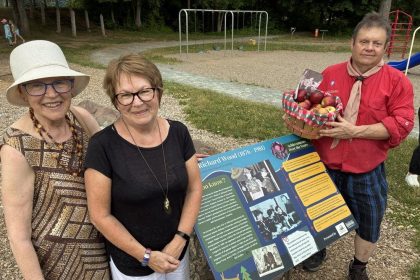British ColumbiaAn independent review of E-Comm, the non-profit that handles emergency communications and 911 call centres in B.C., found a lack of clarity in the role the province plays in the emergency communications system. But the mayor of one Vancouver Island community said what they wanted to hear was more funding. Ladysmith mayor disappointed that funding model for 911 services won’t be changed, after cost concernsKathryn Marlow · CBC News · Posted: Nov 07, 2025 11:57 PM EST | Last Updated: 7 hours agoListen to this articleEstimated 4 minutesThe audio version of this article is generated by text-to-speech, a technology based on artificial intelligence.Two reports into non-profit E-Comm — which runs much of the 911 service across B.C. — are recommending a series of reforms, including the B.C. government taking a more active role in 911 service. (Ben Nelms/CBC)A new report says the province needs more clarity on the role it plays in B.C.’s 911 system. That’s one of the recommendations out of two independent reports into B.C.’s emergency communication dispatch services, which are run by a non-profit known as E-Comm (Emergency Communications for British Columbia Incorporated). The provincial government ordered a review of E-Comm in December 2024 following concerns raised by municipalities, police, and emergency service providers about increasing costs and a lack of transparency. After conducting the review, Ernst and Young issued two reports Friday: one looking at how E-Comm works, and the other offering advice to the province on future service delivery models for emergency communications. While the reports pointed out that 911 successfully serves British Columbians, they also said there is a “lack of well-defined, comprehensive and cohesive service delivery model for emergency communications.” Some of those challenges stem from the fact that when it was founded in the 1990s, E-Comm was just designed to help with emergency incidents in the Lower Mainland.But now, it’s expanded to police and fire calls across most of the province, and is required to update to a national service 911 — which will eventually allow callers to communicate by text, and to share video. An emergency call taker at E-Comm points on a map used by the service. The report recommended a change to how 911 service is delivered in B.C. (Ben Nelms/CBC)The reports list 25 recommendations for E-Comm to enhance its governance and organizational structure so it can better provide emergency communications into the future. It also recommends the province clearly define its role in emergency communications, potentially taking responsibility for the sector. Nina Krieger, B.C.’s Minister of Public Safety and Solicitor General, shown on July 30, 2025. On November 7, she released two independent reports into E-Comm, the non-profit that handles 911 calls in B.C. (Nav Rahi/CBC)Public Safety Minister Nina Krieger said the province will consider all the recommendations, but is focused on making sure E-Comm makes its recommended changes first. She said that could ease some concerns from municipalities, who have been worried about increased costs. “The priority is for E-Comm to strengthen its financial, operational, efficiency and governance practices to get a clear picture of the true cost of service, helping to ensure that local government costs remain sustainable going forward,” said Krieger. Concerns over costsBut Ladysmith Mayor Deena Beeston calls the reports “a disappointment,” saying she wanted to see more strategies to fix municipal concerns.Ladysmith is one of ten municipalities on southern Vancouver Island that spoke out in January, after costs for using E-Comm were downloaded to their municipalities.They asked the province to implement a telecommunications levy to help find 911 services — on items like cellphone and internet bills.West Coast RCMP serves several of the Vancouver Island municipalities that have complained about increased 911 costs: Langford, Colwood and Metchosin. (West Shore RCMP)Right now, E-Comm is funded by services fees charged to municipalities, who raise the money through property taxes or levies on landlines.“We’ve lost a lot of the 911 funding that used to come through our home phone lines because people just don’t have our home phone lines anymore,” said Beeston. Municipalities used to fund 911 services using fees on landline telephones — but landlines are falling out of favour, Ladysmith’s mayor argues. (chainarong06/Shutterstock)Without a change in funding, she said the town will have to increase property taxes. The reports do walk through funding options, including a telecommunications levy similar to several other provinces, but they don’t make any specific recommendations. Minister Krieger said the province would consider a levy, but not yet. Union also not impressed CUPE 8911, the union representing Emergency Communications Professionals of B.C., said it welcomes the report — but also said Friday’s announcement doesn’t fix its core concerns. Union local president Donald Grant said the report recommends the province set service standards — something he’d like them to do now. “I myself am a 911 operator. I’ve taken these calls — and every second counts when you’re dealing with it, whether that be a house fire, whether that be a heart attack or whether that be like a bank robbery in progress. Each second that passes is so absolutely critical,” said Grant. He’d like a standard that every call be connected within 15 seconds. The province says right now, 98 per cent of calls are answered within five seconds. ABOUT THE AUTHORKathryn Marlow is a reporter for CBC Victoria, and the host/producer of the podcast This is Vancouver Island. She covers stories in greater Victoria, and across the whole Vancouver Island region. You can reach her at kathryn.marlow@cbc.ca.
Report says B.C. needs clearer oversight of 911 system











